Peruvian Navy
The Peruvian Navy (Spanish: Marina de Guerra del Perú, abbreviated MGP, literally "Peruvian War Navy") is the branch of the Peruvian Armed Forces tasked with surveillance, patrol and defense on lakes, rivers and the Pacific Ocean up to 200 nautical miles (370 km; 230 mi) from the Peruvian littoral. Additional missions include assistance in safeguarding internal security, conducting disaster relief operations and participating in international peacekeeping operations.
| Peruvian Navy | |
|---|---|
| Marina de Guerra del Perú | |
 Coat of arms of the Peruvian Navy | |
| Founded | 8 October 1821 |
| Country | Peru |
| Allegiance | Ministry of Defense |
| Branch | Navy |
| Size | 25,988 active personnel 51 ships, 33 aircraft |
| Naval headquarters | Callao naval base, Peru |
| Patron | Miguel Grau Seminario |
| Anniversaries | October 8 – Navy's Foundation Day and Anniversary of the Battle of Angamos |
| Fleet | 6 Submarines 7 Frigates 6 Corvettes 2 landing ships, tank 6 River gunboats 2 Training Ships (21 Auxiliaries) |
| Engagements | Gran Colombia-Peru War War of the Peru-Bolivian Confederation |
| Commanders | |
| General Commander of the Navy | |
| Insignia | |
| Flag |  |
| Naval ensign | .svg.png.webp) |
| Naval jack |  |
| Standard |  |
| Roundel |  |
| Low-visibility roundel |  |
The Marina de Guerra del Perú celebrates the anniversary of its creation in 1821 on October 8 and also commemorates the decisive Battle of Angamos, the final part of the naval campaign of the War of the Pacific between Peru and Chile at the end of 1879.
History
19th century
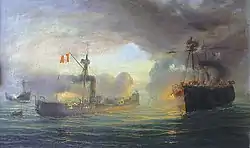
The Marina de Guerra del Perú was established on 8 October 1821 by the government of general José de San Martín. Its first actions were undertaken during the War of Independence (1821–1824) using captured Spanish warships. The Peruvian Naval Infantry was also formed during the war with Spain, performing successfully in their first battle where they seized Arica from the Spanish.[2]
Shortly afterwards it was engaged in the war against the Gran Colombia (1828–1829) during which it conducted a blockade against the seaport of Guayaquil and then assisted in the subsequent Peruvian occupation. The Navy saw further action during the war of the Peru-Bolivian Confederacy (1836–1839) and during the Chincha Islands War with Spain (1866).
The breakout of the War of the Pacific (1879–1883) caught the Peruvian Navy unprepared and with inferior forces in comparison to the Chilean Navy. Even so, hit-and-run tactics carried out by Peruvian Admiral Miguel Grau, commander of the ironclad Huáscar, famously delayed the Chilean advance by six months until his death and defeat at the Battle of Angamos.
20th century
Following the War of the Pacific, the Peruvian Navy had to be completely rebuilt. In 1900 the force consisted of only one cruiser of 1,700 tons displacement, a screw-driven steamer, and ten smaller ships – the latter described by a contemporary British publication as "of no real value".[3] The lengthy process of expansion and rebuilding started in 1907 with the acquisition from the United Kingdom of the scout cruisers Almirante Grau and Coronel Bolognesi, followed by the arrival of two submarines, Ferré and Palacios, from France in 1911. During the Presidency of Augusto B. Leguía (1919–1930) a Navy Ministry was established as well as a Navy Aviation Corps, both in 1920.
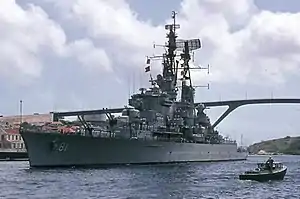
Border conflicts with Colombia in 1911 and 1932 and a war with Ecuador in 1941 saw Peruvian warships involved in some skirmishes in support of the Army. The attack on Pearl Harbor brought World War II to the Pacific and even though Peru did not declare war on the Axis until 1945, its Navy was involved in patrol missions against possible threats by the Imperial Japanese Navy from early 1942 up to mid-1945.
During the 1970s and the first half of the 1980s the Peruvian Navy carried out a major buildup programme[4] which allowed it to take advantage over its traditional rival, the Chilean Navy. The navy purchased one cruiser the BAP Almirante Grau (CLM-81) from the Netherlands, eight Carvajal-class frigates from Italy – four newly purchased and four ex-Lupo-class frigates – as well as six PR-72P-class corvettes from France. The buildup proved to be temporary due to the economic crisis of the second half of the 1980s, forcing the decommissioning of several warships and resulting in a general lack of funds for maintenance.
The economic upturn of the 1990s and into the 2000s would later permit some improvement, although at a reduced force level compared to the early 1980s.
21st century
.jpg.webp)
Into the 21st century, the Peruvian Navy began to modernize their ships. In 2008, the Type 209/1100 submarines were modernized[5] while the Carvajal-class frigates began to be modernized in 2011. The Type 209/1200 submarines began to be modernized in late-2017 beginning with the BAP Chipana (SS-34).[5]
SIMA has continued to construct ships for the Navy. In 2013, SIMA partnered with Posco Daewoo Corporation and Daesun Shipbuilding of South Korea to construct two Makassar-class landing platform docks.[7] The BAP Pisco (AMP-156), recently launched on 25 April 2017, as well as the BAP Paita which is currently under construction will provide Peru with increased expeditionary warfare capabilities, with the ability to accommodate multiple Landing Craft Vehicle Personnel, newly purchased LAV IIs and helicopters.[7][8]
In 2018, a modernization program was initiated to upgrade Peru's Type 209/1200 submarines, the BAP Chipana, BAP Angamos, BAP Antofagasta and BAP Pisagua, with a contract with ThyssenKrupp Marine Systems being made for further assistance with SIMA.[9]
Organization
| Peruvian Navy |
|---|
 Naval Jack of Peru |
| History |
| Ships |
| Insignia |
| Organisation |
The current Commander-in-Chief of the Peruvian Navy is Admiral Nicolas Rios Polastri. Naval Forces are subordinated to the Ministry of Defense and ultimately to the President as Commander-in-Chief of the Peruvian Armed Forces. They are organized as follows:
- Comandancia General de la Marina (Navy General Command)
- Estado Mayor General de la Marina (Navy General Staff)
- Inspectoría General de la Marina (Navy General Inspectorate)
Operational units are divided between three commands:
- Comandancia General de Operaciones del Pacífico
Pacific Operations General Command, it comprises the following units:
- Fuerza de Superficie (Surface Force)
- Fuerza de Submarinos (Submarine Force)
- Fuerza de Aviación Naval (Naval Aviation Force)
- Fuerza de Infantería de Marina (Naval Infantry Force)
- Fuerza de Operaciones Especiales (Special Operations Force)
- Comandancia General de Operaciones de la Amazonía
Amazon Operations General Command, tasked with river patrolling in the Peruvian portion of the Amazon Basin.
- Dirección General de Capitanías y Guardacostas
Directive General of Captains and Coast Guard, oversees Coast Guard operations
Coast Guard
.jpg.webp)
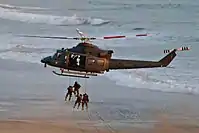
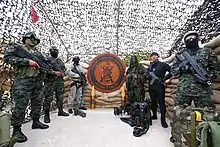
Coast Guard, tasked with law enforcement on Peruvian territorial waters, rivers and lakes. The Peruvian Coast Guard often performs anti-drug trafficking operations within the nation's waters.
Naval Aviation
The Naval Aviation Force (in Spanish): (Fuerza de Aviación Naval, AVINAV) is the air branch of the Peruvian Navy, its roles include anti-submarine warfare, anti-surface warfare, maritime surveillance, reconnaissance and transport of marine personnel. It is also responsible for airborne operations of the Peruvian Marines.
Naval Infantry
- Naval Infantry Brigade
- 1st Naval Infantry Battalion – Ancón
- 2nd Naval Infantry Battalion – Ancón
- Amphibious Support Group
- Fire support Group
- Commando Grouping
- Engineers Unit
- Other units
- 3rd Naval Infantry Battalion – Tumbes
- 4th Naval Infantry Battalion – Puno
- 1st Jungle Naval Infantry Battalion – Iquitos
- 2nd Jungle Naval Infantry Battalion – Pucallpa
- Naval Infantry Detachment Litoral Sur – Mollendo
Bases
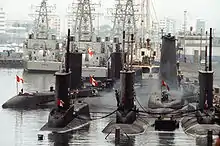
- Ancón – Naval Infantry headquarters and base
- Callao – Main naval base, dockyard and naval aviation base, Naval Medical Center which contains the US Navy unit Naval Medical Research Unit Six
- Chimbote – Minor base and dockyard
- Iquitos – On the Amazon river
- Paita – Minor base
- Pisco – Minor base
- Puno – On Lake Titicaca
- San Juan de Marcona – Naval aviation base
Although most of the fleet is based at Callao, this has not been considered an ideal location since it is also the main outlet for Peruvian trade, causing space and security problems. In the 1980s the building of a new naval base at Chimbote was considered though high costs and a poor economic situation made the project unfeasible.[10]
Personnel
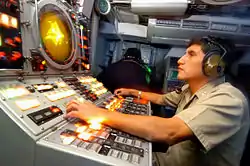
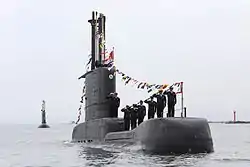
| Personnel (as of 2001)[11] | |
|---|---|
| Commissioned Officers | 2,107 |
| Non-commissioned officers | 16,863 |
| Cadets | 620 |
| NCO in training | 1,533 |
| Enlisted | 4,855 |
| Civilians | 5,079 |
| Total | 25,988 (excl. civilians) |
Ships
Current ships
| Ship | Origin | Type | Class | In service | Notes | |
|---|---|---|---|---|---|---|
| Submarines (5 in service) | ||||||
| BAP Angamos (SS-31) | diesel-electric submarine | Type 209/1200 | Yes | ex-BAP Casma. | ||
| BAP Antofagasta (SS-32) | diesel-electric submarine | Type 209/1200 | Yes | |||
| BAP Pisagua (SS-33) | diesel-electric submarine | Type 209/1200 | Yes | |||
| BAP Chipana (SS-34) | diesel-electric submarine | Type 209/1200 | No | ex-BAP Blume. Currently being upgraded.[5] | ||
| BAP Islay (SS-35) | diesel-electric submarine | Type 209/1100 | Yes | Upgraded in 2008 | ||
| BAP Arica (SS-36) | diesel-electric submarine | Type 209/1100 | Yes | Upgraded in 2008 | ||
| Guided missile frigates (7 in service) | ||||||
| BAP Villavicencio (FM-52) | guided missile frigate | Carvajal-class frigate | Yes | |||
| BAP Almirante Grau (FM-53) | guided missile frigate | Carvajal-class frigate | Yes | BAP Montero until 2017, when became fleet flagship | ||
| BAP Mariátegui (FM-54) | guided missile frigate | Carvajal-class frigate | Yes | |||
| BAP Aguirre (FM-55) | guided missile frigate | Lupo-class frigate | Yes | ex-Orsa (F-567), overhauled and upgraded in SIMA Callao shipyard along with BAP Bolognesi. Currently in sea trials. | ||
| BAP Palacios (FM-56) | guided missile frigate | Lupo-class frigate | Yes | ex-Lupo (F-564) | ||
| BAP Bolognesi (FM-57) | guided missile frigate | Lupo-class frigate | Yes | ex-Perseo (F-566), overhauled and upgraded in SIMA Callao shipyard with locally-made CMS and ESM systems, a Kronos NV 3D radar, MASS countermeasures system and 4 MM40 Block III Exocet missiles replacing Otomat.[15] | ||
| BAP Quiñones (FM-58) | guided missile frigate | Lupo-class frigate | Yes | ex-Sagittario (F-565) | ||
| Guided missile corvettes (6 in service) | ||||||
| BAP Velarde (CM-21) | fast attack craft | PR-72P-class corvette | Yes | |||
| BAP Santillana (CM-22) | fast attack craft | PR-72P-class corvette | Yes | |||
| BAP De los Heros (CM-23) | fast attack craft | PR-72P-class corvette | Yes | |||
| BAP Herrera (CM-24) | fast attack craft | PR-72P-class corvette | Yes | |||
| BAP Larrea (CM-25) | fast attack craft | PR-72P-class corvette | Yes | |||
| BAP Sánchez Carrión (CM-26) | fast attack craft | PR-72P-class corvette | Yes | |||
| Amphibious (3 in service, 1 in construction) | ||||||
| BAP Pisco (AMP-156) | Landing Platform, Dock | Makassar class | Yes | Ordered on July 13, 2013; launched on April 25, 2017; commissioned on June 21, 2018.[16] | ||
| BAP Paita (AMP-157) | Landing Platform, Dock | Makassar class | No | ordered on March 15, 2018; laid down in December 2017[17] | ||
| BAP Callao (DT-143) | Landing Ship, Tank | Terrebonne Parish class | Yes | ex-USS Washoe County | ||
| BAP Eten (DT-144) | Landing Ship, Tank | Terrebonne Parish class | Yes | ex-USS Traverse County | ||
| River gunboats vessels (6 in service) | ||||||
| BAP Loreto (CF-11) | River gunboat | Loreto class | Yes | |||
| BAP Amazonas (CF-12) | River gunboat | Loreto class | Yes | |||
| BAP Marañón (CF-13) | River gunboat | Marañón class | Yes | |||
| BAP Ucayali (CF-14) | River gunboat | Marañón class | Yes | |||
| BAP Clavero (CF-15) | River gunboat | Clavero class | Yes | severely damaged by an uncontrolled fire in her first operational deployment on May 25, 2010; leaving two crewmen badly injured.[18] Returned to service on July 27, 2012 during the BRACOLPER 2012 exercise.[19] | ||
| BAP Castilla (CF-16) | River gunboat | Clavero class | Yes | laid down on April 9, 2010 in the SIMA Iquitos shipyard, launched on June 8, 2013 and commissioned on March 14, 2016, second and final ship of its class, has some improvements over its sister ship, mainly in armament[20] | ||
| Training ships (2 in service) | ||||||
| BAP Unión (BEV-161) | Sail training ship | – | Yes | laid down on December 8, 2012 in the SIMA Callao shipyard, commissioned January 27, 2016, with an estimated cost of US$50 million.[21][22] | ||
| BAP Marte (ALY-313) | Sailing yacht | – | Yes | assigned to the Peruvian Naval School as a training ship | ||
| Tugs and support ships (5 in service) | ||||||
| BAP Unanue (AMB-160) | Diving support ship | Sotoyomo class | Yes | ex-USS Wateree | ||
| BAP San Lorenzo (ART-323) | Torpedo recovery vessel | – | Yes | |||
| BAP Morales (RAS-180) | Diving support offshore tugboat | Morales class | Yes | ordered in 2014, 50 TBP class locally designed tugboat, equipped to support diving, firefighting and rescue operations.[23] Delivered in November 2016 | ||
| BAP Selendón | Harbour tugboat | 20 TBP class tug | Yes | Built in SIMA Callao shipyard, ordered in 2011.[24] Delivered in the first quarter of 2012. | ||
| BAP Medina | Harbour tugboat | 20 TBP class tug | Yes | Built in SIMA Callao shipyard, ordered in 2011. Delivered in late 2012.[24] | ||
| Tankers and barges (4 in service) | ||||||
| BAP Caloyeras (ACA-111) | Water barge | YW-83 class | Yes | ex-US YW-128 | ||
| BAP Noguera (ACP-118) | Fuel barge | YO type | Yes | ex-US YO-221 | ||
| BAP Gauden (ACP-119) | Fuel barge | YO type | Yes | ex-US YO-171 | ||
| BAP Tacna (ARL-158) | Replenishment Ship | Amsterdam class | Yes | ex-HNLMS Amsterdam Built in 1995, acquired in July 2014 from the Royal Netherlands Navy, commissioned on December 4, 2014 at the Den Helder naval base, Netherlands.[25] | ||
| Hospital vessels (5 in service) | ||||||
| BAP Morona (ABH-302) | River hospital ship | Morona class | Yes | |||
| BAP Corrientes (ABH-303) | Small river hospital craft | – | Yes | |||
| BAP Curaray (ABH-304) | Small river hospital craft | – | Yes | |||
| BAP Pastaza (ABH-305) | Small river hospital craft | – | Yes | |||
| BAP Puno (ABH-306) | Lake hospital ship | Yavarí class | Yes | ex-Yapura operated by the Peruvian Coast Guard | ||
| Scientific research vessels (6 in service) | ||||||
| BAP Carrasco (BOP-171) | Oceanographic research ship | NC-704 class | Yes | 95-m long steel-hulled vessel designed to operate in the Antarctic region as well as in Peruvian waters. Construction contract signed in December 2014 with Freire Shipyard. Keel-laying scheduled for June 22, 2015, to be delivered July 2016.[26] Commissioned in May 2017.[27] | ||
| BAP Stiglich (AH-172) | Hydrographic survey ship | Morona class | Yes | |||
| BAP Zimic (COMBSH-173) | Hydrographic survey ship | Dokkum class | Yes | ex-HNLMS Abcoude minesweeper. ex-BAP Carrasco, repowered in 2006 with 2 Volvo Penta engines at SIMA Callao, in 2015 received a high power multibeam echosounder. | ||
| BAP La Macha (AEH-174) | Hydrographic survey ship | – | Yes | |||
| BAP Carrillo (AH-175) | Hydrographic survey ship | van Straelen class | Yes | ex-HNLMS van Hamel minesweeper | ||
| BAP Melo (AH-176) | Hydrographic survey ship | van Straelen class | Yes | ex-HNLMS van der Wel minesweeper. Repowered in 2006 with 2 Volvo Penta engines at SIMA Callao. | ||
Museum Ships
| Vessel | Origin | Type | Class | Decommissioned | Notes |
|---|---|---|---|---|---|
| BAP América (RH-90) | River gunboat | América class | restored at SIMA Iquitos shipyard, on display in Clavero naval station. | ||
| BAP Abtao (SS-42) | Sierra-type submarine[28] | 2 de Mayo class | 1998 | become a museum ship in 2004 |
Recently Decommissioned Ships
| Vessel | Origin | Type | Class | Decommissioned | Notes |
|---|---|---|---|---|---|
| BAP Bayovar (ATP-154) | Oil tanker | Grigoriy Nesterenko type | 2017 | ex-Petr Schmidt, auctioned on March 21, 2018[29] | |
| BAP Zorritos (ATP-155) | Oil tanker | Grigoriy Nesterenko type | 2017 | ex-Grigoriy Nesterenko, auctioned on March 21, 2018[29] | |
| BAP Almirante Grau (CLM-81) | Guided missile cruiser | De Zeven Provinciën class | 26 September 2017[30] | ex-HNLMS De Ruyter (C801) | |
| BAP Guardian Rios (ARA-123) | Offshore tugboat | Cherokee class | 2015 | ex-USS Pinto, inactive since 2014, to be scrapped | |
| BAP Dueñas (ARB-126) | Harbour tugboat | PC-461-class | 2015 | ex-USS PC-1138, decommissioned in 1956 and sold, then first converted into icebreaker and finally into a tugboat (hull shortened), acquired by the Peruvian Navy in 1984. Inactive since 2014, to be scrapped[31] | |
| BAP Unión (ABE-161) | Transport ship | Ilo class | December 2014 | ex-BAP Mollendo (ATC-131). Decommissioned in late 2014, towed to be scrapped in Ecuador. | |
| BAP Carvajal (FM-51) | Guided missile frigate | Carvajal-class frigate | 26 December 2013 | Transferred to the Coast Guard under the name BAP Guardiamarina San Martin (PO-201) after being stripped down of its missile weaponry and main radar, reclassified as Patrullera Oceánica (Offshore patrol vessel).[32] | |
| BAP Paita (DT-141) | Tank landing ship | Terrebonne Parish class | September 2012 | ex-USS Walworth County (LST-1164), sunk as a target during the exercise Independencia | |
| BAP Pisco (DT-142) | Landing Ship, Tank | Terrebonne Parish class | 2012 | ex-USS Waldo County (LST-1163), scrapped that year after sold. | |
| BAP Ferré (DM-74) | Guided missile destroyer | Daring class | 13 July 2007[33] | ex-HMS Decoy | |
| BAP Talara (ATP-152) | Replenishment tanker | Talara class | 12 August 2008[34] | capable of underway replenishment at sea from the stern | |
| BAP Lobitos (ATP-153) | Oil tanker | Sealift Pacific class | 20 July 2008[35] | ex-USNS Sealift Caribbean (T-AOT-174) |
Equipment
| Name | Origin | Type | Version | Used by | Notes | |
|---|---|---|---|---|---|---|
| Naval artillery | ||||||
| Oto Melara 127/54 Compact Gun | dual-purpose naval gun | 127/54 Compact | Lupo-class | |||
| Oto Melara 76/62 Compact Gun | dual-purpose naval gun | 76/62 Compact | PR-72P-class | |||
| Oto Melara Twin 40 Compact Gun | Close-in weapon system (CIWS) | Twin Forty | Lupo-class PR-72P-class Makassar-class | |||
| Anti-ship missiles | ||||||
| MBDA Otomat | Anti-ship missile (AShM) | Otomat II Block 3 | Lupo-class | on December 8, 2008 an updated Otomat missile was successfully launched from BAP Aguirre, hit a target at a range in excess of 150 km (93 mi).[36] | ||
| MBDA Exocet | Anti-ship missile (AShM) | MM40 Block 3 | Lupo-class | four fire control systems and sixteen missiles ordered on December 15, 2010.[37] Scheduled to be installed in the 4 Aguirre class frigates. | ||
| MBDA Exocet | Anti-ship missile (AShM) | MM38 | PR-72P-class | |||
| MBDA Exocet | Anti-ship missile (AShM) | AM39 Block 1 | ASH-3D Sea King | Land-based. Currently not embarked in any surface unit of the Peruvian Navy | ||
| Surface-to-air missile | ||||||
| MBDA Aspide | Surface-to-air missile (SAM) | Aspide 1A | Lupo-class | |||
| 9K38 Igla | MANPADS | 9K310 Igla-1 | PR-72P-class Peruvian Naval Infantry | used in MGP-86 mount for close air defence to be replaced with the FN-6 missile system | ||
| FN-6 | MANPADS | FN-6 | Peruvian Naval Infantry | a small batch acquired in July 2009 for US$1.1 million[38] | ||
| Torpedoes | ||||||
| Atlas Elektronik SUT | 533 mm heavyweight torpedo | SUT 264 | Type 209 submarine | |||
| Atlas Elektronik SST | 533 mm heavyweight torpedo | SST-4 mod 0 | Type 209 submarine | |||
| Mark 44 torpedo | 324 mm lightweight torpedo | Mk 44 mod 1 | Lupo-class AB-212ASW ASH-3D | |||
| Alenia-Whitehead A244/S | 324 mm lightweight torpedo | A244/S | Lupo-class AB-212ASW ASH-3D | |||
Peacekeeping operations
The Peruvian Navy has been actively involved in several United Nations Peacekeeping Operations. As of June 2006 Naval Infantry and Special Operations troops have been deployed to United Nations Peacekeeping Force in Cyprus (UNFICYP) (embedded in the Argentine forces[39] ) and United Nations Stabilization Mission in Haiti (MINUSTAH). Peruvian naval officers have also been deployed to United Nations Organization Mission in the Democratic Republic of the Congo (MONUC), United Nations Operation in Côte d'Ivoire (UNOCI), United Nations Mission in Sudan (UNMIS) as United Nations Militar Observers (UNMOs). By 2012 the Peruvian Navy sent its first officer to serve in United Nations Interim Security Force for Abyei.
Gallery
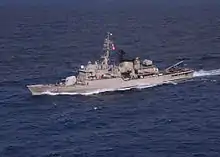 BAP Carvajal (FM-51).
BAP Carvajal (FM-51).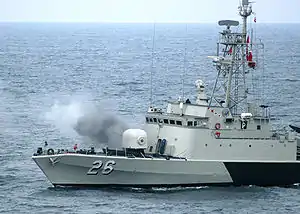 BAP Sánchez Carrión (CM-26).
BAP Sánchez Carrión (CM-26). Submarines BAP Pisagua (SS-33), BAP Chipana (SS-34), and BAP Islay (SS-35).
Submarines BAP Pisagua (SS-33), BAP Chipana (SS-34), and BAP Islay (SS-35).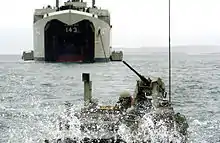 Naval infantry coming ashore from BAP Callao (DT-143).
Naval infantry coming ashore from BAP Callao (DT-143)..jpg.webp) BAP Mollendo (ATC-131).
BAP Mollendo (ATC-131)..jpg.webp) BAP Clavero and BAP Castilla berthed in Iquitos Naval Base
BAP Clavero and BAP Castilla berthed in Iquitos Naval Base.jpg.webp) BAP Unión leaving the Callao harbour
BAP Unión leaving the Callao harbour
See also
Notes
- PERÚ, Empresa Peruana de Servicios Editoriales S. A. EDITORA. "Peru Gov't names new Air Force and Navy general commanders". andina.pe.
- "Comandancia de Fuerzas de Infanteria – Marina de Guerra del Perú". marina.mil.pe. Marina de Guerra del Perú. Archived from the original on December 29, 2016. Retrieved December 29, 2016.
- Keltie, J. S., ed. (1900). The Statesman's Year Book: Statistical and Historical Annual of the States of the World for the Year 1900. New York: MacMillan. p. 887. (Retrieved via Google Books 3/4/11.)
- "Armed Forces Strength in selected years, 1829 – 1992". Retrieved February 21, 2015.
- "Peruvian Navy begins Type 209/1200 submarine modernization". Naval Today. Retrieved December 15, 2017.
- "Peru launched its First LPD – BAP Pisco Landing Platform Dock". Navy Recognition. May 4, 2017. Retrieved July 27, 2017.
- "GDLS culmina las entregas de LAV II a la Infantería de Marina peruana-noticia defensa.com". Defensa.com. August 19, 2016. Retrieved July 23, 2017.
- "Peruvian Navy begins Type 209/1200 submarine modernization". Naval Today. Retrieved December 15, 2017.
- "La base de Chimbote", Caretas, 1985.
- , based on Supreme Decree DS No. 69 DE/SG of 2001. Archived September 27, 2007, at the Wayback Machine
- Archived April 27, 2009, at the Wayback Machine
- Archived February 21, 2009, at the Wayback Machine
- Archived July 13, 2009, at the Wayback Machine
- Fish, Tim (June 29, 2011). "Briefing: South America Naval Capabilities". Jane's Defence Weekly: 289.
- Sanchez, Alejandro. "Peruvian Navy commissions BAP Pisco". Jane's 360. IHS. Retrieved July 28, 2018.
- Sanchez, Alejandro. "Peru to construct second landing platform vessel". Jane's 360. IHS. Retrieved July 28, 2018.
- "Dos heridos deja incendio de BAP "Clavero" en el río Putumayo, informan" (in Spanish). Andina. May 25, 2010. Archived from the original on March 5, 2012. Retrieved February 21, 2015.
- Marina de Guerra del Perú (August 2, 2012). "Perú: Unidades fluviales de Brasil y Colombia participaron en el ejercicio BRACOLPER 2012" (in Spanish). Base Naval. Archived from the original on August 5, 2012. Retrieved August 11, 2012.
- "Marina de Guerra del Perú entregó PIAS "Río Putumayo II" y Cañonera Fluvial B.A.P "Castilla" (CF-16) en eficaz contribución a los programas de inclusión social del Estado". Peruvian Navy Website. Archived from the original on June 2, 2016. Retrieved May 2, 2016.
- "Servicios Industriales de la Marina construirán Buque Escuela a Vela". Peruvian Navy. December 7, 2012. Archived from the original on April 16, 2013. Retrieved December 18, 2012.
- Benvenuto, Carlos Ramírez (December 6, 2012). "Un nuevo buque escuela para la Marina y el Perú" (PDF). El Comercio (in Spanish). Retrieved February 21, 2015.
- "Positivos avances en construcción del Remolcador Auxiliar de Salvamento B.A.P. "Morales" RAS-180". Peruvian Navy Website. Archived from the original on June 2, 2016. Retrieved May 2, 2016.
- "NotiSIMA Año 5, Edición 31" (PDF) (in Spanish). SIMA. July 17, 2011. Archived from the original (PDF) on September 24, 2015. Retrieved February 21, 2015.
- "En Holanda, se afirmó el Pabellón Nacional del Buque Logístico B.A.P. Tacna" (in Spanish). Peruvian Navy. Archived from the original on December 13, 2014. Retrieved February 21, 2015.
- Ing, David; Toremans, Guy. "Spain's Freire shipyard set to cut steel on Peru's new survey ship". IHS. Retrieved April 24, 2015.
- Toremans, Guy (May 9, 2017). "Peruvian Navy commissions new multirole oceanographic research vessel". IHS Jane's 360. Archived from the original on May 10, 2017. Retrieved May 10, 2017.
- Historic Naval Ships Association BAP ABTAO (SS-42) Archived November 24, 2010, at the Wayback Machine
- "Venta por Subasta Pública Nro. 001-2018 – DIRBINFRATER". Marina de Guerra del Perú. Retrieved July 28, 2018.
- Sanchez, Alejandro (September 26, 2017). "Peruvian Navy designates new flagship". Jane's 360. IHS. Retrieved September 28, 2017.
- "Lapeer (PC 1138) ex-PC-1138". NavSource Online: Submarine Chaser Photo Archive. NavSource Naval History. Retrieved May 5, 2016.
- "Marina de Guerra del Perú realizará ceremonia de Zarpe de Expedición Científica a la Antártida – ANTAR XXII, Colocación de la Quilla del Remolcador Auxiliar de Salvamento y Patrullera Marítima, Transferencia del BAP Carvajal a DICAPI". Peruvian Navy. Archived from the original on December 27, 2013. Retrieved December 26, 2013.
- "Supreme Decree No. 014-2007-DE/MGP" (PDF). Archived from the original (PDF) on September 29, 2007. Retrieved August 25, 2009. (1.33 MB). July 13, 2007.
- "Supreme Decree No. 018-2008-DE/MGP" (PDF). (361 KB). August 23, 2009.
- "Supreme Decree No. 014-2008-DE/MGP" (PDF). Archived from the original (PDF) on October 8, 2011. (84.9 KB). August 23, 2009.
- "Peruvian Navy Carries Out Record Breaking Launch". Jean Dupont. MBDA. December 17, 2008. Archived from the original on June 11, 2009. Retrieved September 7, 2009.
- "PCM transfiere más de S/. 114 millones para adquisición de material militar" (in Spanish). Andina. December 15, 2010. Retrieved February 21, 2015.
- "Perú: Adquisición de misiles MANPADS". Alejo Marchessini. Defensa.com. July 27, 2009. Archived from the original on May 1, 2018. Retrieved September 11, 2009.
- "UNFICYP Facts and Figures – United Nations Peacekeeping Force in Cyprus". United Nations. Archived from the original on September 7, 2009. Retrieved April 26, 2014.
Sources
- Baker III, Arthur D., The Naval Institute Guide to Combat Fleets of the World 2002–2003. Naval Institute Press, 2002.
- Basadre, Jorge, Historia de la República del Perú. Editorial Universitaria, 1983.
- "La base de Chimbote", Caretas, 855: 31 (June 17, 1985).
- Gibbs, Jay (2005). "Question 30/04: The Bolivian Navy in the War of the Pacific". Warship International. XLII (3): 242–247. ISSN 0043-0374.
- Ortiz Sotelo, Jorge, Apuntes para la historia de los submarinos peruanos. Biblioteca Nacional, 2001.
- Pixley, William & Walker, Hartley P. (2001). "Question 33/00: Peruvian Warships Loa and Victoria". Warship International. International Naval Research Organization. XXXVIII (3): 248. ISSN 0043-0374.
- Rial, Juan, Los militares tras el fin del régimen de Fujimori-Montesinos.
- "Los Programas de Renovacion y Modernizacion de la Marina de Guerra del Peru", Alejo Marchessini – Revista Fuerzas de Defensa y Seguridad (FDS) N° 430. Paginas 32 a 35.
- "Entrevista al Almirante Carlos Tejada Mera, Comandante General de la MArina de Guerra del Peru", Alejo Marchessini – Revista Fuerzas de Defensa y Seguridad (FDS) N° 430. Paginas 36 a 43.
External links
- Official Peruvian Navy Website
- Maquina de Combate – Photo gallery.
- Servicio Industrial de la Marina – Peruvian Navy Shipyards. In English and Spanish.
- The Peruvian Navy: The XIX Century Maritime Campaigns – a series of articles covering the history of the 19th century Peruvian Navy by Juan del Campo.
.svg.png.webp)